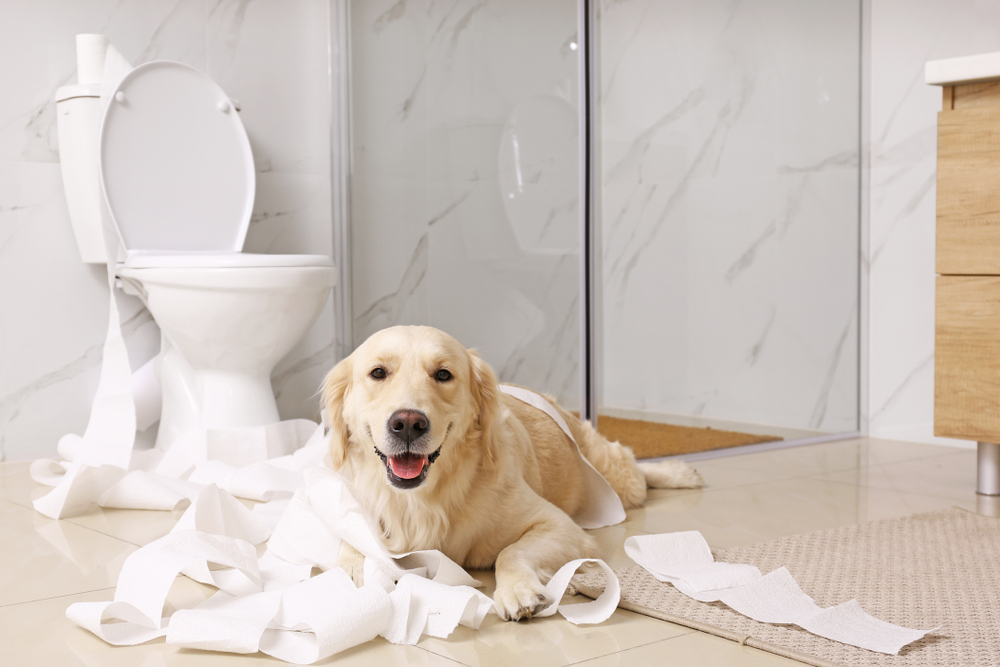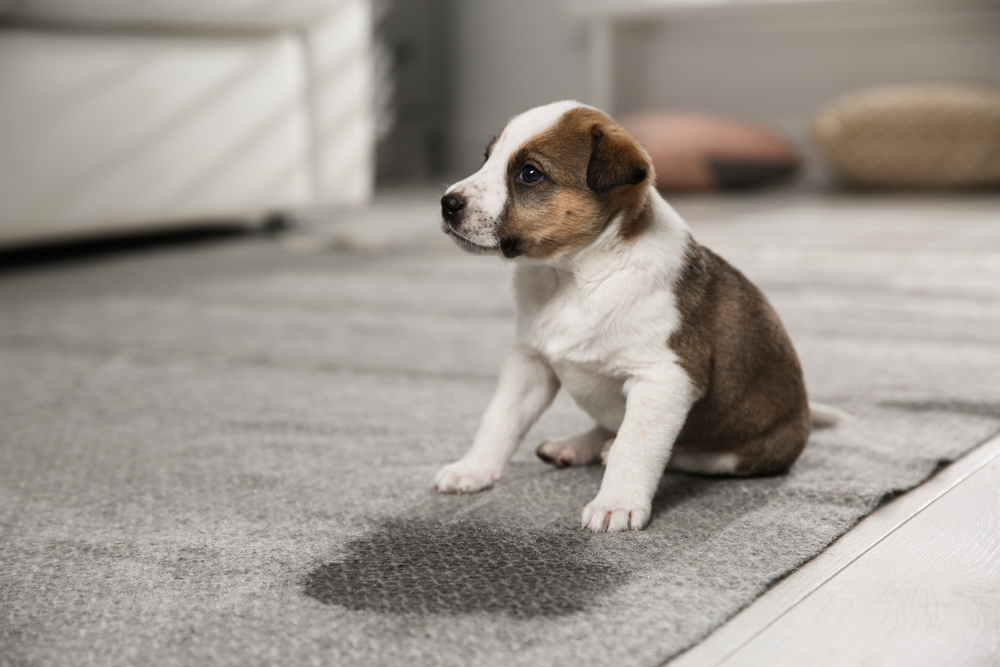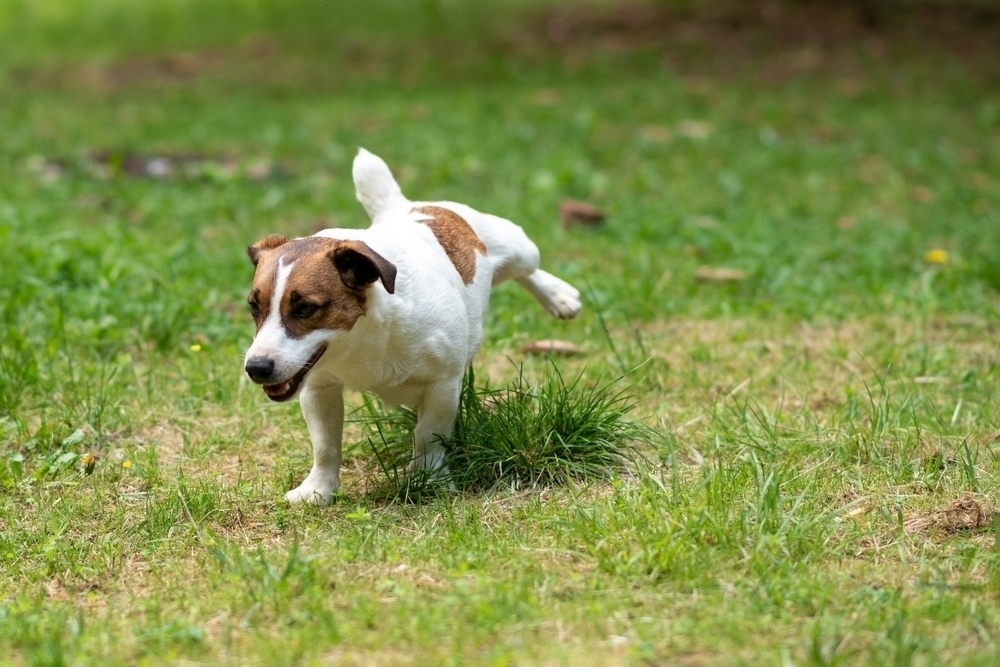My Dog Won’t Ask to Go Potty: Help!
Published on August 12, 2016

“My dog won’t ask to go potty” – so now what? The number one thing we want our dogs to communicate to us is when they need a potty break — and it’s also the number two thing as well, isn’t it? Nobody wants a dog to have a pee or poop accident in the house: It’s not pleasant to clean up, sometimes you can’t fully get rid of the stain or odor and inadvertently allowing it can encourage the dog to develop bad habits.
So what do you do if you’re living with a dog who doesn’t ask to go out? In my experience, there are usually two possible reasons for this behavior. The first is that the dog asks, but the person doesn’t notice, misreads the communication or doesn’t act quickly enough.
The second may be that the dog has unintentionally been allowed to have accidents in the house.
Let’s talk about how to handle each of these situations.

How to Know When A Dog Asks to Go Potty
All featured products are chosen at the discretion of the author. However, Vetstreet may make a small affiliate commission if you click through and make a purchase.
Our dogs watch us 24/7, studying our every move as if their next meal depends on it. (And maybe it does.) They know right down to the left eyebrow twitch what we’re going to do next. But we don’t always return the favor. If our dogs aren’t standing right in front of us crossing their legs, tap dancing and grinning anxiously, we often don’t notice or recognize what they’re asking.
Dogs have many different ways of telling us they need to go out — right now! Some paw at us, some bark, some stand at the top of the stairs or in front of the door.
Of course, there’s the classic turning in circles before squatting. But other dogs are more subtle. Sometimes all you get is a quick glance or a brief period of restlessness.
Folks, these are signals you need to learn. Every dog is different. That’s why the best thing you can do is to interact with your dog throughout the day. It’s really easy to ignore a paw at your knee and assume that he just wants attention or a treat.
It’s really easy not to notice that he’s sitting in front of the door to the backyard or to think that he just wants to chase squirrels. (Maybe he does, but first he’d probably like to pee.) Pay attention to the times of day your dog usually wants to go out and be sure you check on what he’s doing then.
When you see his signal, act on it. If you make him wait — especially if he’s a young puppy — you’re going to find yourself down on your knees with a roll of paper towels and a bottle of carpet cleaner, sopping up an accident.

My Dog Won’t Ask to Go Potty: Stop Accidents in Their Tracks
When your dog has an accident in the house, it’s a mess — but the consequences can last longer than the clean up. A dog who is allowed — even unintentionally — to do his business inside may not realize that he needs to ask to go out.
It’s not necessarily clear to him that outside is the place he needs to be when it’s time to poop or pee. And yelling at him after the fact doesn’t inform him where you want him to go; it only reinforces the idea that he doesn’t want to do the deed in your presence.
From the first day your pooch enters your home, whether he’s a puppy or an adult dog, it’s essential that you make sure he knows where the potty spot is and that you reward him for using it. For this reason, you need to go out with him, every time he needs to go.
Simply turning him out in the yard doesn’t give you the opportunity to praise him when he potties so he knows he did right. And letting him have the run of the house before he’s fully house-trained gives him opportunities to make mistakes. Your job is to prevent them by keeping him attached to you with a leash, taking him out on a schedule or kindly confining him to a crate when you can’t supervise him.
If your dog is a senior instead of a puppy, it may have become more difficult for him to hold his bladder for long periods. Let him out to go potty right before bedtime and first thing in the morning. Heck, if you’re up during the night, as so many of us are once we become seniors ourselves, let him out again while you’re at it.
Help firm your dog’s stools and keep their gut in top shape with a digestive supplement such as Great Poop Total Digestive Support chewables. Your veterinarian can direct you on why probiotics are worth considering. A few reasons include immune system support, keeping poops regular, firming up stools, and keeping the gut healthy.
But if you’re doing everything right and he’s still having accidents? Then it’s time to seek the advice of your veterinarian, especially if the behavior is new or comes on suddenly. Your dog may have a health problem he’s trying to tell you about.
More on Vetstreet:





